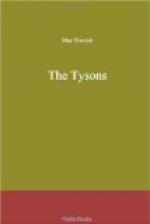And now—the frivolous, feather-headed little wife, whom he had held so cheap and wronged so lightly, urging her folly as almost a justification of the wrong, she too—She appalled him with the terrific eternity of her love. Was it possible that this feeling, which he had despised as the blind craving and clinging of the feminine animal, could take a place among the supreme realities, the things more living than flesh and blood, which in his way he still contrived to believe in? The idea made him extremely uncomfortable, and he put it from him. He had drifted into that stagnant backwater of the soul where the scum of thought rises to the surface. Molly was better than most women; but, poor little thing, there was nothing transcendent about her virtues. She loved him after the manner of her kind.
No—no—no. She loved him as no other woman had ever loved him before. She loved him because she believed in him against the evidence of her senses. If she only knew! A diabolical impulse seized him to awaken her then and there and force her to listen to a full confession of his iniquities, without reticence and without apology. Surely no woman’s love could stand before that appalling revelation? But no; what other women would do he would not undertake to say; she would only look at him with her innocent eyes, reiterating “It makes no difference.”
Would he have cared more if she had cared less? On the whole—no. And what if she had been a woman of a higher, austerer type? That woman would have repelled him, thrown him back upon himself. She had drawn him by her very foolishness. He had been brought back to her, again and again, by the certainty of her unreasoning affection. By its purity also. That had saved him from falling lower than a certain dimly defined level. If there was a spark of good in him he owed it to her. He had never sunk so low as in that intolerable moment when he had doubted her. For the behavior of the brute is low enough in all conscience; but below that is the behavior of the cad. Tyson had his own curious code of morals.
Yes; and in the raw enthusiasm of remorse he had made all manner of vows and promises, and he felt bound in honor to keep them. He had talked of a rupture with the past. A rupture with the past! You might as well talk of breaking with your own shadow. The shadow of your past. Imbecile expression! The past was in his blood and nerves; it was bone of his bone and flesh of his flesh. It was he. Or rather it was this body of his that seemed to live with a hideous independent life of its own. And yet, even yet, there were moments when he caught a glimpse of his better self struggling as if under the slough of dissolution; the soul that had never seen the sun was writhing to leap into the light. He would have given the whole world to be able to love Molly. There was no death and no corruption like the death of love; and the spirit of his passion had been too feeble to survive its divorce from the flesh.




